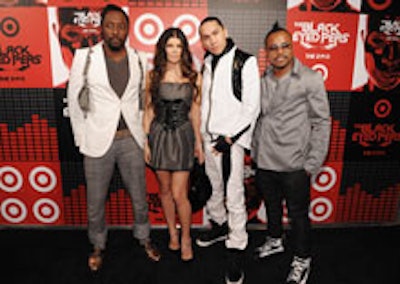
Texting, blogging, and online social networking have already made it a breeze for guests to send out tips to their friends and readers on scoring access to private parties. Now, with the increasing popularity of Twitter, the volume of recipients is growing exponentially and the details are leaking in real time. Crashers, gawkers, and paparazzi have instant access to more information than they’ve ever had before—on an easy-to-search platform—and security professionals and planners agree that 140 characters are more than enough to cause some trouble.
Barry Meyerson, president of Manhattan-based security firm Meyerson Associates Inc., first noticed Twitter’s impact during New York Fashion Week in September 2008. As celebrities and partygoers shared details online, queues outside venues got longer, and throngs of paparazzi seemed thicker.
“It’s opened up to the public what was once a very private realm,” Meyerson says. “Some of these people on Twitter have thousands or tens of thousands of followers, and when details about the parties get out, people in that area just come over to try their luck. They come to the door with the right lexicon, language, and names.”
Meyerson offers one recent job, Calvin Klein’s launch party for the High Line Park, as an example of the new challenges facing event security: “I went online afterward to research and saw how many live tweets went out about it. It wasn’t just ‘This is an incredible spot’ or ‘What a good opening,’ but announcements of which entrances weren’t busy and where to try to get in. We had an overwhelming number of people show up to an event that had to be contained to a certain number for legal and safety purposes.”
The most-tweeted parties tend to have high-profile celebrity attendees, often at venues in nightlife-heavy neighborhoods, such as New York’s meatpacking district or West Hollywood’s Sunset Strip.
“It’s become a game of cat and mouse,” says Aaron Johnson, president of San Diego-based security management consultants Johnson & Associates. “It’s affecting the way planners for many of the celebrity events [we work on] are dealing with invitations. Some are even becoming like raves, where emails go out to specific people with date and time information, but no official location.”
But even keeping the venue a secret until the last minute doesn’t silence Twitter-happy guests once they’ve arrived. Meyerson worked on a private, unpublicized party at New York’s Standard Hotel earlier this year that saw several attendees spill the beans. “It was a private, invite-only list, but it was tweeted from the inside that Madonna was there with her new boyfriend, and that brought out the paparazzi when we hadn’t even planned for them.”
In addition to following celebrity Twitter users, photographers can use Twitter’s search function to track certain celebrities’ movements over the course of a night and, in many instances, learn where they might be at an exact moment.
Adding unexpected photographers to the stragglers and rejected crashers lingering outside an event can cause problems with the neighborhood and, in some cases, the police. Streets get blocked to traffic, invited guests can’t make their way to the door, and where an event once might have had 200 gawkers leering at a red carpet, it might now have 500, thanks to tweeted announcements.
Despite all the buzz around Twitter, it has yet to become a worry for many event hosts. “I haven’t had any clients even mention a concern about Twitter yet, but I have brought it to their attention,” says Cara Kleinhaut, owner of Los Angeles production firm Caravents. “For certain events where I think people might be more prone to tweet about a party, I’m now requesting extra security.”
One such event was a June record-release party for the Black Eyed Peas. A small venue and artist-approved guest list meant that even savvy crashers couldn’t find a way inside. “We had a strong security presence, and we needed all of it,” recalls Kleinhaut. “I saw afterward that people were tweeting about the party and who was there.”
The potential for tweet-induced hassles can necessitate extra planning for hosts and security teams. “Depending on the instructions of the party staff at the front door, it’s not security’s job to decide who actually gets in,” says Chuck Garelick, special events services vice president at Elite Investigations Ltd., who’s been dealing with eager crowds on the other side of the velvet rope since he was head of security at Studio 54. “We just have to address these extra people who won’t be getting in and do it in a polite way, so as to not escalate the situation.”
Since the Twitter effect shows no sign of slowing—and once guests arrive at a party, there’s not much you can do, short of confiscating cell phones—the primary concerns for planners and security providers are preparing for possible tweets and ensuring that leaks don’t stem from the staff.
A gag order might seem like a no-brainer, but the technology is still new enough that many users don’t even realize the potential consequences of their actions. “As a producer, I just have to make sure that no one from my staff or any of our hired vendors are the ones doing the tweeting,” Kleinhaut says.
But for all of the extra hassle, event pros don’t consider Twitter a complete nuisance. “Is it a strain on the security staff?” Garelick asks. “Yes, but it’s ultimately a positive for an event. When guests use Twitter to get the word out about parties, it generates press and it generates buzz. And that’s good for planners, sponsors, and the business.”



















